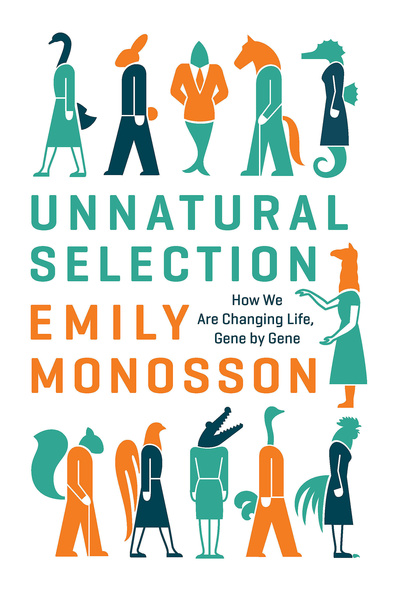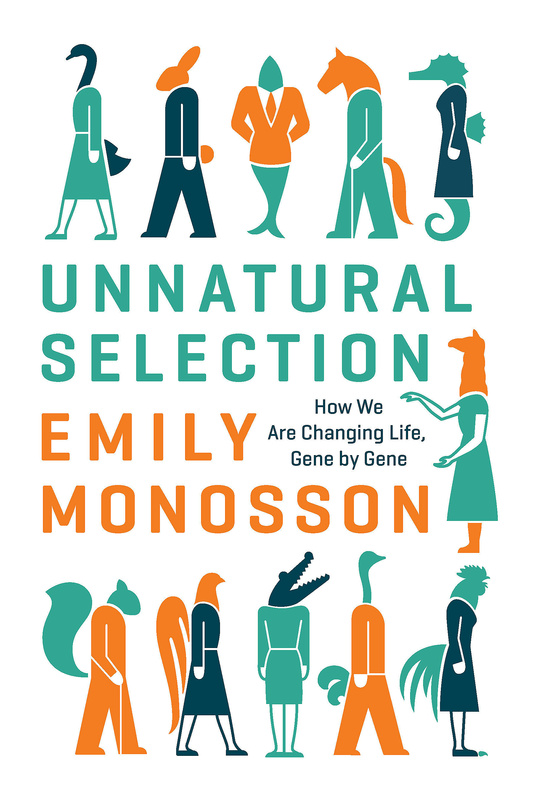
200 pages, 6 x 9
Paperback
Release Date:29 Mar 2016
ISBN:9781610914994
Hardcover
Release Date:15 Nov 2014
ISBN:9781610914987
Gonorrhea. Bed bugs. Weeds. Salamanders. People. All are evolving, some surprisingly rapidly, in response to our chemical age. In Unnatural Selection, Emily Monosson shows how our drugs, pesticides, and pollution are exerting intense selection pressure on all manner of species. And we humans might not like the result.
Monosson reveals that the very code of life is more fluid than once imagined. When our powerful chemicals put the pressure on to evolve or die, beneficial traits can sweep rapidly through a population. Species with explosive population growth—the bugs, bacteria, and weeds—tend to thrive, while bigger, slower-to-reproduce creatures, like ourselves, are more likely to succumb.
Monosson explores contemporary evolution in all its guises. She examines the species that we are actively trying to beat back, from agricultural pests to life-threatening bacteria, and those that are collateral damage—creatures struggling to adapt to a polluted world. Monosson also presents cutting-edge science on gene expression, showing how environmental stressors are leaving their mark on plants, animals, and possibly humans for generations to come.
Unnatural Selection is eye-opening and more than a little disquieting. But it also suggests how we might lessen our impact: manage pests without creating super bugs; protect individuals from disease without inviting epidemics; and benefit from technology without threatening the health of our children.
Monosson reveals that the very code of life is more fluid than once imagined. When our powerful chemicals put the pressure on to evolve or die, beneficial traits can sweep rapidly through a population. Species with explosive population growth—the bugs, bacteria, and weeds—tend to thrive, while bigger, slower-to-reproduce creatures, like ourselves, are more likely to succumb.
Monosson explores contemporary evolution in all its guises. She examines the species that we are actively trying to beat back, from agricultural pests to life-threatening bacteria, and those that are collateral damage—creatures struggling to adapt to a polluted world. Monosson also presents cutting-edge science on gene expression, showing how environmental stressors are leaving their mark on plants, animals, and possibly humans for generations to come.
Unnatural Selection is eye-opening and more than a little disquieting. But it also suggests how we might lessen our impact: manage pests without creating super bugs; protect individuals from disease without inviting epidemics; and benefit from technology without threatening the health of our children.
[An] examination of rapid evolution driven by artificial poisons. [Monosson's] tour takes in antibiotic-resistant staph bacteria, herbicide-resistant agricultural weeds, DDT-resistant bedbugs and the blue crabs of Piles Creek, New Jersey. Living in a soup of pollutants including mercury and hydrocarbons, these decapodal survivors display altered behaviours as well as resistance. Monosson ends with a thought-provoking look at epigenetics—evolution 'beyond selection'.
This fascinating and thought-provoking book...Monosson eloquently and in layman’s terms describes how life is resilient and details case studies of organisms that have rapidly evolved to overcome whatever (usually chemical) ways of killing them we humans have concocted.
...a stealth lesson in basic biology — just the book to give to a friend or family member who thinks that evolution has little to do with day-to-day practicalities.
disturbing but fascinating...bright, clear, and accessible prose...A concise book with a powerful message.
WOW! This deceptively slender book packs a helluva powerful punch....Unnatural Selection is an engaging and eye-opening book that is essential reading for everyone—city dwellers and country folk alike—who lives on planet Earth....Like reading a dystopian novel, this book will capture your imagination and keep you awake into the wee hours. But unlike a dystopian novel, the author actually proposes evolutionarily-sound strategies for what we can do to stop the damage before it becomes lasting.
It is an honest attempt to wake us up and realize the bigger and more complex picture nature shows us.
Unnatural Selection is a well-written book in the tradition of Rachel Carson’s Silent Spring. It usefully updates that epochal work, engagingly presenting new research on the impact of chemical products from herbicides to antibiotics, both on other species and on ourselves. Despite its elegant brevity, it covers a satisfying breadth of ecological and evolutionary concerns in environmental toxicology. It can be safely offered as recommended reading for biology undergraduates, congressional staffers, or general readers who are concerned about the environment.
Toxicologist Monosson looks at the alarming effects of rapid evolution caused by pesticides, antibiotics and pollutants.
The power of evolution, toxicologist Monosson (Evolution in a Toxic World) demonstrates, is quite amazing: when strong selective pressure is coupled with short generation times, significant changes in populations can occur over very brief intervals. ... She concludes with an interesting, if tangential, discussion of epigenetics.
Part science-lover’s paradise, part horror novel, Monosson describes these human-influenced evolutionary terrors in fascinating detail.
Unnatural Selection is eye-opening and more than a little disquieting.
Emily Monosson, an environmental toxicologist, describes in compelling and occasionally frightening detail how humans are the driving force behind the rapid evolution among cancer cells, bacteria, weeds, bedbugs and other creatures.
[A] remarkable book...this book should be read by anyone who cares about the environment in the Anthropocene.
If you’ve ever wondered why you should care about evolution, Unnatural Selection is the book for you. And if you haven’t wondered that, you need to read this to find out what you’re missing. Environmental toxicologist Emily Monosson, with prose that is clear, succinct, and so interesting it’s hard to put the book down, explains how people are speeding up an evolutionary arms race both within and around us. And that arms race is between us, disease, pests, and many other species on Earth. A thoroughly engaging read for anyone that cares about the role of humans on our planet.
Darwin's evolutionary laboratories were far flung islands and exotic shores. Emily Monosson uncovers rapid evolution much closer to home, in our farm fields, cities and even among the microbes in our own bodies. Through personal stories and scientific discovery, this readable, accessible account explores the evolution that Darwin never knew.
In a world where the denial of evolution – or its importance – is still common, this book should convert even the most entrenched skeptics.
Prepare for the unexpected! Evolution has consequences and when we rapidly drive the process, through our profligate use of antibiotics and toxic chemicals, we should be prepared for unexpected outcomes. Monosson succinctly shows us how and why our inability to control diseases and pests and grow sufficient food to eat is an inevitable product of our anthropogenic toxification of the Earth. Eye opening and timely.
Emily Monosson is an environmental toxicologist, writer, and consultant. She is an adjunct professor at the University of Massachusetts, Amherst, author of Evolution in a Toxic World: How Life Responds to Chemical Threats, and the editor of Motherhood, the Elephant in the Laboratory: Women Scientists Speak Out.
Introduction: Life Changing Chemicals
PART I. Unnatural Selection in a Natural World
Chapter 1. Discovery: Antibiotics and the Rise of the Superbug
Chapter 2. Prevention: Searching for a Universal Vaccine
Chapter 3. Treatment: Beyond Chemotherapy
Chapter 4. Defiance: Rounding Up Resistance
Chapter 5. Resurgence: Bedbugs Bite Back
PART II. Natural Selection in an Unnatural World
Chapter 6. Release: Toxics in the Wild
Chapter 7. Evolution: It’s Humanly Possible
PART III. Beyond Selection
Chapter 8. Epigenetics: Epilogue or Prologue?
PART I. Unnatural Selection in a Natural World
Chapter 1. Discovery: Antibiotics and the Rise of the Superbug
Chapter 2. Prevention: Searching for a Universal Vaccine
Chapter 3. Treatment: Beyond Chemotherapy
Chapter 4. Defiance: Rounding Up Resistance
Chapter 5. Resurgence: Bedbugs Bite Back
PART II. Natural Selection in an Unnatural World
Chapter 6. Release: Toxics in the Wild
Chapter 7. Evolution: It’s Humanly Possible
PART III. Beyond Selection
Chapter 8. Epigenetics: Epilogue or Prologue?





